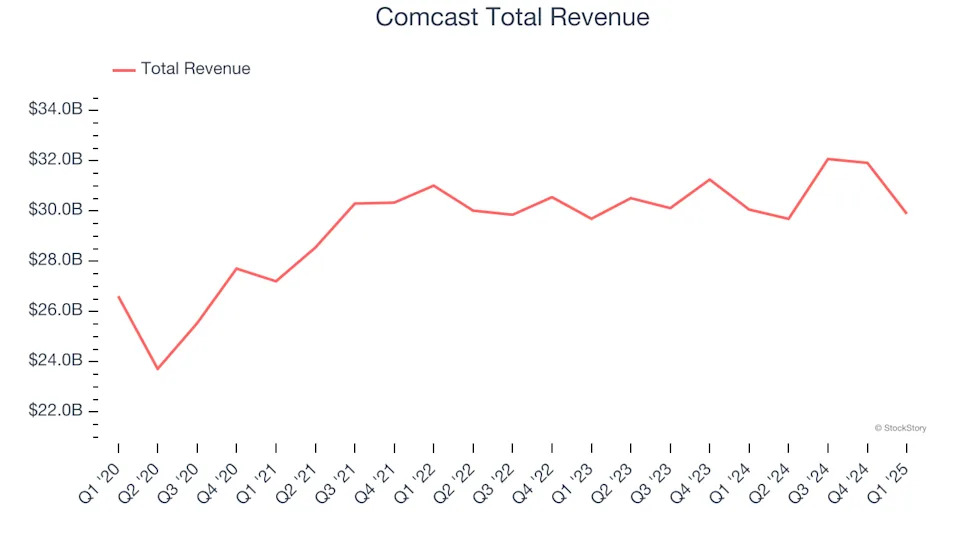VZ Stock: Verizon’s Outlook, Performance, and Long-Term Potential in 2025

Verizon Communications (NYSE:VZ), commonly known as Verizon, remains one of the leading names in the U.S. telecommunications industry. For investors, VZ stock is often seen as a reliable bet for stable returns, steady dividends, and defensive portfolio positioning. But in a year marked by shifting consumer trends and intensifying competition, does VZ stock still stand out as a smart buy?
Verizon’s Recent Performance: How Does VZ Stock Stack Up?
The first quarter of 2025 offered a mixed bag for wireless, cable, and satellite telecom stocks. Among these, VZ stock garnered attention for its steady, if unspectacular, results. According to Yahoo Finance, Verizon reported revenues of $33.49 billion—up 1.5% year over year and meeting analyst expectations. Investors saw a minor bump in share price, with VZ stock trading at about $43.63 following the earnings report.
While Verizon’s incremental growth impressed many, the entire sector grappled with industry-wide challenges such as cord cutting and fierce pricing wars. Verizon’s scale and brand strength ensure a stable core business, but slower growth has tempered expectations.
What’s Driving the Value of VZ Stock?
Verizon’s business model relies heavily on wireless subscription revenues. With about 31% of the U.S. market, alongside a vast fiber optic infrastructure, Verizon owns significant recurring revenue streams. This foundation has enabled the company to maintain a robust dividend, consistently growing for 17 years in a row.
Yet, VZ stock has lagged broader markets, slipping around 30% in five years compared to the S&P 500’s 85% gain. Investors are drawn to the company’s strong 6.5% dividend yield, according to Forbes’ in-depth outlook, but some question its long-term growth prospects amid market saturation and heightened competition from rivals like T-Mobile and AT&T.
Challenges and Catalysts: The 5-Year Outlook for Verizon
Looking ahead, VZ stock’s performance will depend on several key factors:
- Subscriber Growth: Verizon continues to add customers, but rivals outpace its net additions. The domestic wireless market nears full penetration, making customer gains hard-fought.
- 5G and Fiber Initiatives: Heavy investments in 5G and expanding fiber networks position Verizon to benefit from surging data demand and new enterprise applications. Partnerships, like those in edge computing, could unlock new revenue streams.
- Competitive Pressure: Price competition from T-Mobile and emerging cable MVNOs has dented Verizon's traditional advantages in reliability and coverage.
- Dividend and Value: Despite slow capital appreciation, VZ stock’s payout ratio and free cash flow generation keep its dividend secure—a major selling point for income-focused investors.
The base case scenario, as outlined in this detailed Forbes analysis, predicts VZ stock will likely trade between $45 and $52 by 2029. That reflects stable but modest appreciation, appealing mostly to those seeking income with lower risk rather than aggressive growth.
Is Now the Time to Buy VZ Stock?
Current analyst sentiment and quantitative metrics suggest VZ stock could be undervalued versus historical averages, both on earnings and cash flow bases. For investors prioritizing steady dividends and portfolio stability, Verizon offers compelling yield and defensive characteristics.
However, those seeking high growth may favor other areas of the tech or telecom sector, where revenue and subscriber growth rates run higher. Before making a move, consider comparing Verizon’s standing with its industry peers—this Yahoo Finance article offers a timely breakdown of Q1 sector performance to inform your decision.
Conclusion: Weighing Stability vs. Growth in VZ Stock
VZ stock, bolstered by a strong dividend and solid market share, continues to attract income-oriented investors. While near-term appreciation potential is moderate, Verizon’s entrenched position, robust free cash flow, and ongoing network investments provide meaningful downside protection. For U.S. investors seeking income and a defensive play in telecom, Verizon remains a stock worth close consideration.
Want to dive deeper? Check out this thorough 5-year forecast for Verizon Stock on Forbes for even more insight on VZ stock’s future.